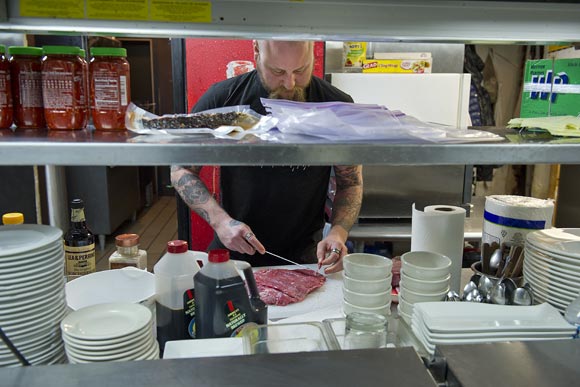It’s 11 a.m. on a Wednesday, and
Bourbon in Adams Morgan is empty. Empty, that is, except for the tattooed Eric Judycki, who’s hacking through chunks of meat in the kitchen.
Judycki, a bartender and beer manager at The Big Hunt by night, spends his mornings slicing through 25 pounds of beef at a time, which he then marinades in his special mix of honey, Sriracha, and a couple of other ingredients.
Right around midnight (and after Bourbon’s kitchen has closed), Judycki is back, dropping the beef into the dehydrator. Twenty hours later, he’s got his special jerky, which he sells at area bars (it features prominently in Bloody Mary’s at Meridian Pint and at Smoke and Barrel, among other establishments).
Judycki started
Jerkface Artisanal Beef Jerky after his girlfriend gifted him a dehydrator for Christmas last year. “I messed around with it at home for months,” he says, a process complicated by the fact that said girlfriend is vegetarian. (“There’d be meat everywhere,” he says. “I’d tell her, ‘Leave the kitchen for an hour.’”)
When he started selling at local bars, he faced a challenge that confronts lots of food entrepreneurs -- how to follow D.C.’s strict food preparation laws (any food sold in the District must be prepared in a commercial kitchen) on a shoestring budget?
So he, like a handful of others, tapped into a hidden resource – the kitchen space of local restaurants and bars. At some establishments, that space goes unused more than 50 percent of the time. Letting in food entrepreneurs could mean extra income or new menu additions, with very little overhead.
These days, Judycki keeps his three dehydrators at Bourbon, along with his supplies. He uses the kitchen before the bar opens and after closing, setting up his spices just like he’d have them at home.
An official food incubator like
Union Kitchen, which recently announced it's opening a second location to keep up with demand, might be more convenient, but the arrangement between Judycki and Woods is cheaper: Woods doesn't pay rent (a friend of a friend helped Judycki negotiate the Bourbon deal). In return, he’s fastidious, he says, wiping down the counters and taking out the trash. “By the time I’m done, “ he says, “it’s like I wasn’t here.”
Working at Bourbon has helped Judycki keep up with increased demand. And Bourbon manager James P. Woods says it’s served them well too. Once, they used the dehydrator to dry some pineapple for a specialty drink. At some point, they may add Jerkface to their menu.
But more importantly, Woods says, he trusts Judycki and wants to see him grow. “It’s hard to find space to work,” Woods says. “And there are all of these spaces that are just kind of hidden.”
More and more kitchens are teaming up with local producers, says Stacey Price, executive director at Think Local First DC. But she’s surprised the arrangement hasn’t become commonplace.
“It is a commitment but in the end it is a win-win,” she writes in an email. “New fresh ideas, innovation (maybe even a stake in that person's brand) in exchange for space they are not currently using.”
That’s the idea behind StartUp Kitchen, a Think Local First DC competition where locals present their food business ideas to a panel of experts. The winner is paired with a District restaurant willing to share kitchen space and retail area for weekly pop-ups.

Meg Murray, a former Capitol Hill staffer, won the contest last year with Thunder Pig Confectionery, specializing in artisanal baked goods. Murray teamed up with Hello Cupcake in Dupont Circle where she’d trek on Monday nights to set up her Tuesday pop-up.
In addition to the obvious benefits (Hello Cupcake sold Thunder Pig treats at their register), Murray says she learned a lot from owner Penny Karas.
“She’s been through war in terms of owning a bakery with really tight margins,” Murray says. “I'd worked in front of the house, and in back of the house. But it was great to see it from an owner's perspective.”
Still, Murray now runs Thunder Pig out of Union Kitchen, a “food incubator” where cooks can rent kitchen and dining space by the hour. To get space, cooks go through a stringent application process.
“I do see the benefit,” Murray says of working in the kitchen of a restaurant. “The challenge for me is the hours. Chances are you're using it at really odd times which isn't idea for me.”
That’s the challenge now facing Antonia Loucks, founder of Craft Kombucha. Loucks started her business by accident – she made way too much kombucha one day, and decided to give it to neighbors as a gift.
“I guess I'm not the kind of person where you're like ‘she’s gonna poison me,’” she says. “So people gave it a try.”
It was a hit. “They told me ‘you need to get this in the farmer's market,’” she says.
Someone donated a tent to her, someone else lent her tables, a neighbor who owns Baked and Wired gave her some cups to start. And crucially, Radius Pizza let her share their tent at the Mount Pleasant Farmer’s Market.
She began selling out regularly. “Eventually, I realized I needed to get into a commercial kitchen, and I couldn't because of capital,” Louchs says. “Heller’s [in Mt. Pleasant] took me in.” But she wasn’t able to start working until after the busy Christmas season. As a result, she’s just getting off the ground.
Still, she plans to be completely operational next month, and she’s grateful for the space. “I just couldn’t do it another way,” she says.